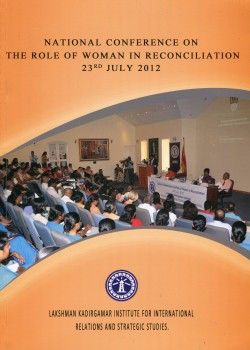
National Conference on the Role of Women in Reconciliation
23rd July 2012
Publisher: Lakshman Kadirgamar Institute for International Relations and Strategic Studies
Place of Publish: Sri Lanka, Colombo
Year: 2012
Page Numbers: 60
Acc. No: 4577
Class No: 305.4 NAT-SL
Category: Books & Reports
Subjects: Gender and Women
Type of Resource: Monograph
Languages: English
The National Conference on the Role of Women in Reconciliation was convened by Lakshman Kadirgamar Institute for International Relations and Strategic Studies (LKIIRSS) on 23rd July, 2012. Government officials, women activists, human rights experts, diplomatic community, private sector, international organizations, academia, students and media participated at the conference. Nine distinguished speakers from private and public sectors, and civil society organisations shared their experiences, expertise and unparalleled work related to women and reconciliation in Sri Lanka at the conference. The conference brought into focus efforts of social entrepreneurs, women activists, organisations and state programs for war affected women in Sri Lanka. It also created a dialogue on constraints and issues where immediate policy intervention or policy alterations are required. The outcomes and recommendations from the National Conference on the Role of Women in Reconciliation will facilitate the policy makers by providing policy inputs to feed into the development of an action plan for the inclusion of women in the peace process at a national level. The functions women have in reconciliation processes are complex which is also reflected in the multiple roles women play in the society. One crucial role for women in most societies is that of a mother. Women act as role models for their children and contribute significantly in shaping the minds and attitudes within the family nucleus. Women are motivated to protect their children and ensure security of their families. Women also have the unique ability to cut across borders and to unify communities. They can act as bridge builders and have the ability to ease internal divisions. They have an innovative way to cope with problems and support each other. Engaging women in the national reconciliation process can therefore have ripple effects, thus affecting the reconciliation process most positively and investing the entire society with a score of social benefits.



